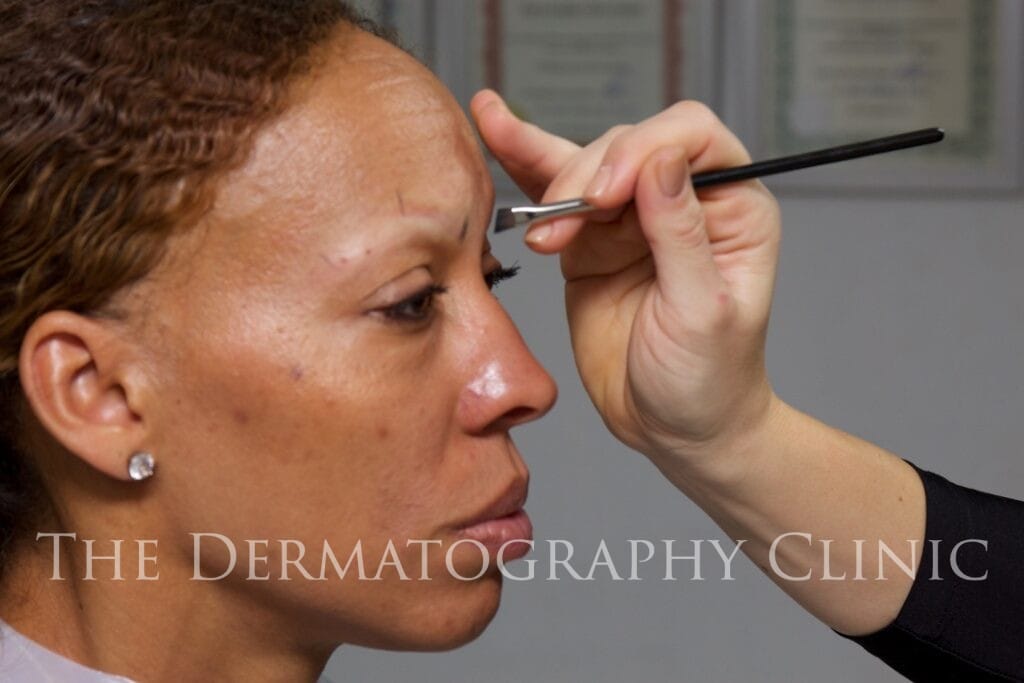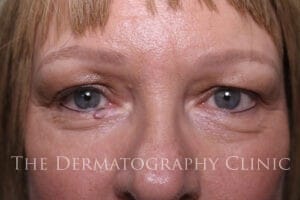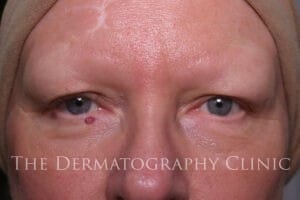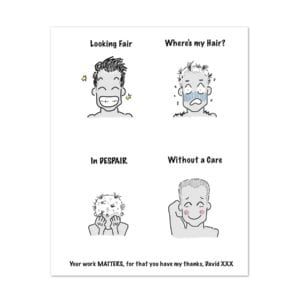Micropigmentation for Alopecia: How It’s Changing Lives and Helping People Feel Whole Again
My Unexpected Path to Micropigmentation
Expert insights from Renée – Founder & Lead Practitioner, The Dermatography Clinic, Spitalfields, London
When I first stumbled into the world of permanent makeup, I had no idea it would lead me here—offering life-changing treatments for people suffering from alopecia and various other medical conditions. Back then, when I first started, I was running a couture bridal boutique with my mum, designing and hand-making wedding dresses. I came from an art and design background, and makeup wasn’t even on my radar.
That all changed when I had my eyeliner tattooed. As someone always in the gym and constantly on the go, I couldn’t believe how amazing it felt to wake up with flawless, professionally applied eyeliner that never smudged and stayed immaculate 24/7. It made me feel more confident, polished, and ready for anything, while saving me so much time. It was the best money I ever spent on myself, and I still feel that way. ..I wanted to share this feeling with other women—and that’s how my journey with micropigmentation began.
I trained not knowing if I’d be any good—or even if I could handle working with needles. But the first time I worked on a face, I knew I’d found something that felt even more aligned with who I am as an artist. Wedding dresses taught me the kind of detail you can’t fake—The detail and creativity I’d honed through years of couture dressmaking laid the perfect foundation and I’ll always value my time as a designer. Couture dressmaking taught me precision and patience; it gave me a sharp eye and a love for detail. Still, the first time I worked on a face, something shifted. For the first time, I felt like an artist. It just made sense and it came naturally to me.
The Moment That Changed Everything
A few years into my practice, something happened that reshaped everything I thought I knew about micropigmentation.
A gentleman reached out—my first male client. He had alopecia and no eyebrows. He’d seen what I was doing for women to improve their thinning eyebrows and wondered if I could help him too. Of course, I said yes.
What I didn’t realise at the time was that this experience would change my life. Seeing his face when he looked in the mirror, seeing himself after the procedure—it was unforgettable. That moment had a real immediate impact on me. It made me realise that what I do goes so far beyond makeup. It’s not vanity. It’s about restoring identity, dignity, confidence and I realised that there people out there who really needed eyebrows.
From then on, I made it my mission to help anyone and everyone who needed me—not just women, not just beauty clients, but people dealing with real emotional struggles tied to medical hair loss.
Understanding Alopecia: More Than Just Hair Loss
Alopecia is often misunderstood. It’s a general term for hair loss, and it comes in different forms including:
- Alopecia Areata – An autoimmune disorder where the immune system attacks hair follicles, causing patchy hair loss.
- Androgenetic Alopecia – Commonly known as male or female pattern baldness, a hereditary condition.
- Telogen Effluvium – Often temporary, triggered by stress, illness, or hormonal changes.
- Alopecia Totalis/Universalis – Complete loss of scalp (totalis) or body (universalis) hair.
- Traction Alopecia – Caused by prolonged tension or pulling on the hair.
Hair loss can be sudden or gradual. It can affect the scalp, brows, lashes, facial hair, or the whole body. In my clinic, I see how deeply this impacts people—mentally, emotionally, socially.
Today around 1 in 10 of my clients suffer from alopecia specifically. But whether it’s alopecia or another form of hair loss, the emotional toll is often the same. My role is not just to offer treatments, but to listen, understand, and offer a tailored experience to suit the individual in helping them to restore confidence.
How Micropigmentation Helps for Alopecia
Micropigmentation—also known as permanent makeup or scalp micropigmentation—may not be a medical cure, but it’s a powerful, non-invasive solution that can visually restore what’s been lost.
By using precise pigment application, it creates the illusion of natural hair. When done by an experienced artist, it blends seamlessly with your skin tone and existing hair (if any), resulting in a natural, realistic result.
Common Treatment Options I Offer:
For Women:
Click [For women] above to see real before-and-after photos of women with alopecia.
Treatment Options:
Click on the treatment below to view dedicated galleries with more examples of each:
- Nano Stroke Brows – Hyper-realistic, hair strokes that recreate full, natural brows.
- Eyelash Enhancements – Delicate dots along the lash line to mimic natural lashes, or a fine line to redefine the eyes.
- Scalp Micropigmentation (SMP) – Ideal for thinning areas. While not suitable for every case (e.g., frontal fibrosing alopecia or totalis), it can be highly effective for diffuse or patchy loss, or androgenic alopecia.
For Men:
Click [For men] above to see real before-and-after photos of men with alopecia.
Treatment Options:
Click on the treatment below to view dedicated galleries with more examples of each:
- Scalp Micropigmentation (SMP) – Perfect for recreating a shaved-head look, restoring receding hairlines, or filling thinning areas.
- Nano Stroke Brows – Subtle yet effective eyebrow restoration, looking full, real, and masculine when done by a skilled artist.
- Beard Micropigmentation (SMP) – Restores facial hair or fixes patchy beards.
- Eyelash Enhancements – Even men experience lash loss, and this treatment can restore lashes naturally.
Why I Take Every Case Personally
Every client I work with is unique. Each story, each journey—it all matters deeply to me. I approach every single treatment as if it were my own loved one sitting in that chair. From consultation to aftercare, it’s about building trust, crafting a bespoke solution, and walking alongside you through the process.
I love my work. I genuinely love what I do. It gives me purpose and pride every single day, and I never stop learning or evolving to give the very best care.
 Testimonials
Testimonials
These are just a few of the many amazing testimonials received from people with alopecia—explore more on our dedicated Alopecia pages.
“The best thing I’ve done for my alopecia”
– Ali Haling
“I can’t express how much Renée has helped my confidence. I suffered with alopecia for 5 years without hope of having any hair or treatment to resemble hair. Having gone to Renée and having micropigmentation done was the best thing I’ve done for the alopecia. She’s the best at what she does!”
“I felt so much more confident from the moment I left”
– Sally McEnallay
“I went to Renée at quite a low point following a diagnosis of alopecia areata after cancer treatment. My previously thick eyebrows had totally disappeared. She was immediately welcoming, calm and very knowledgeable and I liked that her client photos showed a wide variety of faces, skin colours, ages, genders.
She listened to my concerns studied my face and photographs and took great care to give me eyebrows that looked like my own. From the moment I left her, I felt so much more confident, and able to go about my life without worry. She is totally professional, highly skilled and is committed to the care of her clients above everything else. Renee is really special, and I can’t recommend her highly enough.”
“My eyebrows restored”
– Nick Cartwright
“Alopecia led me to The Dermatography Clinic in search for a solution to the problem of a pair of rapidly disappearing eyebrows. As a 46 year old male the world of derma-graphics & micropigmentation was something completely new to me. I needn’t have worried. Renee is simply great.
There is nothing superficial about the work done here. It is meticulous and thoughtful. Renee’s approach is sensitive, carefully considered and detail driven. Renee is clearly someone who is passionate about her work and the positive impact it can make on other people’s lives. Her enthusiasm and pride in her profession shine brightly.
In my case the result of this is a pair of eyebrows which look authentic and feel familiar. They are my eyebrows restored. Family and friends have been very impressed with what Renee has been able to do for me. I would have no hesitation in recommending. Thank you Renee!”
FAQs About Micropigmentation for Alopecia
1. Is permanent makeup safe?
Absolutely—when performed by trained, licensed professionals following strict hygiene protocols. It’s important to disclose any health conditions so we can adapt the approach as needed.
2. Is it worth it?
For many of my clients, it’s life-changing. Not just in how they look—but how they feel. It reduces the emotional toll of daily makeup, wigs, and insecurity.
3. Who helps with hair loss?
- Dermatologists – Diagnose and treat the underlying condition.
- Trichologists – Hair and scalp specialists.
- Micropigmentation Artists – Provide visual restoration through skilled cosmetic tattooing.
- Therapists – For the emotional impact.
- Support groups – Community makes a huge difference.
4. Does alopecia affect both men and women?
Yes, equally—and across all ages. The effects are deeply emotional for everyone, which is why I tailor my work to suit all genders with compassion and respect.
5. Can hair loss cause anxiety?
Yes, and I’ve seen how it affects people deeply. PMU and SMP can play a big role in restoring self-confidence. Alongside therapy, education, and community, it’s a holistic way forward.
A Safe, Supportive Space in the Heart of Spitalfields
At The Dermatography Clinic in Spitalfields, East London, I’ve created a private, welcoming space where clients feel seen, heard, and empowered. Whether you’re navigating alopecia or another form of hair loss, you’re not alone. I’m here to help you reclaim your confidence and reflect your inner strength on the outside too.
No rushed appointments. No one-size-fits-all. Just honest, expert care—tailored for you.
Proud to Support Alopecia UK
The Dermatography Clinic Spitalfields, London is proud to be a member of Alopecia UK’s Service Directory and support the work of Alopecia UK, a charity working hard to improve the lives of those affected by alopecia through aims of support, awareness and research. Find out more about Alopecia UK and the work they do here: www.alopecia.org.uk
Want to Know If Micropigmentation is Right for You?
Book a consultation and let’s talk. I’ll take the time to understand your condition, your goals, and together we’ll find the best option for you—You deserve to feel like you again. And I’d be honoured to help you on that journey.





